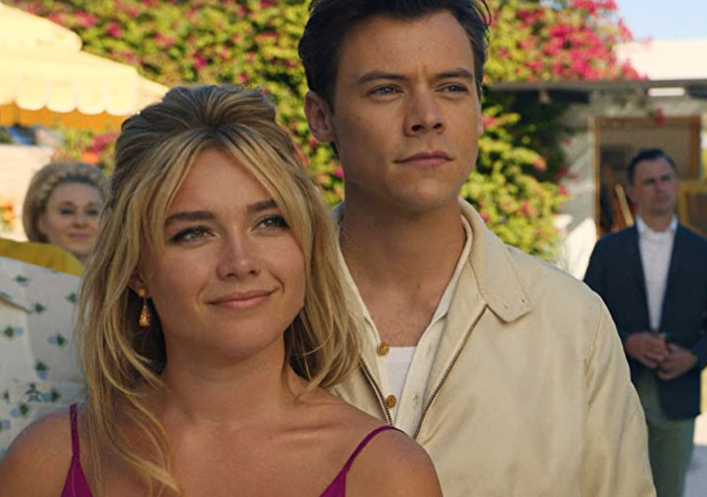When it comes to thrillers, there’s something so fascinating about a movie or series that gives us something very pretty, only to poke at and eventually tear down its imperfections as the story plays out.
‘The Victory Project’ homestead and lifestyle in Olivia Wilde’s charmingly daring, Don’t Worry Darling tells us that it’s idyllic. At least it appears to be, if you’re a man in the 1950s, or a woman who idealises being a housewife.
The homestead, where various couples live in a fictional bubble, is made out to be a kind of haven. The audience and the characters are told that the community they’re part of, in a land far far away from the rest of society, is about order that’s good for them, and working towards the future. Sound familiar?
The men all work on a seemingly pivotal but ever-mysterious project, and the women do everything to ensure that every other element of their lives are perfect – the house, the cooking, the cleaning, the social niceties – you get the outdated picture.
However, with glossy cinematography, interludes of parties and lounging on lawns and upbeat music, we’re almost tricked into thinking that everyone is happy.
But this doesn’t last for long. Wilde doesn’t leave us in suspense in wondering whether we entered a romantic drama by accident.
Between the character Margaret and the haunted song our protagonist (or Betty Friedan’s “happy housewives heroine”) Alice (Florence Pugh) hums, we know something is wrong. It doesn’t take long until the egg cracks and we’re spiralling with Alice who followed her white rabbit Margaret into a world of questions. And, as bright and clean as the film appears in aesthetics, a mess unravels that only those who dared to go beyond the barrier can or want to see.
We later find out on the adventure Alice is gaslighted against her spidey-senses (and some hardcore evidence) telling her that the Victory Project is nothing more than a very clever illusion, created by the big boss Frank (Chris Pine). What it really hides, I’ll leave you to find out, with the note that it gives strong Black Mirror energy, or a mild WandaVision.
I found the film to be as beautiful to look at as it was ugly (in terms of subject matter).
A play on second-wave feminism? Couldn’t miss it if you tried. An inner glance at being a victim of gaslighting? Loud and clear, thanks Jack (Harry Styles). Control as the villain over both sexes in different ways? It echoed throughout the whole cinema.
Beyond the socio-political conversation the film ignites, a few questions rang in my ears as loudly as Alice’s tune (which spoiler, will get stuck in your head too).
Did Wilde connect us enough to the characters to make us throw-your-popcorn upset that their world was orchestrated? Beyond Alice, I barely remembered the other characters’ names.
Was it too obvious too soon? Contrary to other reviews, I think that it was for the film’s benefit that the ‘something’s not right here’ feeling didn’t only come in the last 30 minutes. What did drag however, was what exactly the problem was.
Did the film leave us with closure? Not at all. The cliffhanger ending works in some plotlines, but for Don’t Worry Darling we needed more motive, something that explained better why the bubble was created so that we could appreciate it’s bursting a little more.
The story of a well-dressed cult will definitely have you sitting at the edge of your seat. Don’t Worry Darling is a must-watch, bearing in mind you will have questions that the film won’t answer. If you love a utopia-turns-to-dystopia plot with a few jabs at society and a strong female lead, this is definitely up your alley.
ALSO SEE:

